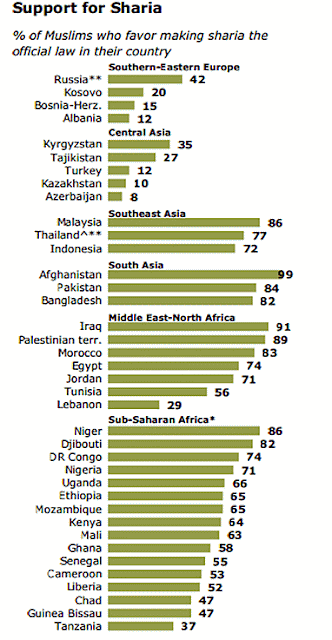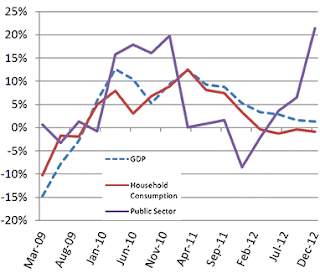The Economics of the 'Turkish Spring'
Pitched battles between anti-government demonstrators and Turkish police over several days at Istanbul's Taksim Square constitute a national uprising against Recep Tayyip Erdogan's incipient Islamist dictatorship. As of this writing on June 2, tens of thousands of regime opponents are in control of the heart of Istanbul while police have withdrawn. The economic distress of Turkish households is an important factor in the country's political upheaval.
News media have already dubbed the demonstrations a "Turkish Spring". That is a turnabout, for the "Turkish model" was touted two years ago as the solution to the economic and social problems of the failing police states of Arab nationalism. Erdogan's supposedly moderate Islamism and dynamic economic management supposedly offered a way out for Egypt and other failed economies of the Middle East.
Erdogan had declared himself a "servant of Sharia" during his 1994 mayoral campaign in Istanbul, but most Western observers chose to take the would-be Turkish dictator at his subsequent word that he would respect the secular character of the Turkish state.
It was never to be. Erdogan did not preside over an economic miracle - contrary to the credulous estimates of many Western observes - but arranged, rather the usual sort of Third World credit bubble, which has left Turkish consumers to tighten their belts in response to a devastating debt burden. "Economic troubles will dominate the political agenda, and Erdogan's claim to leadership of the Islamic world - let alone his own country - will look far less credible," I warned in this space April 23 (see Turkey's ticking debt time-bomb, Asia Times Online), just before Moody's assigned Turkey an investment-grade rating, perhaps the poorest judgment by the rating agency since it put a "AAA" stamp on securities backed by subprime mortgages.
Turkey's problems can't really be compared to the 2011 revolts in Muslim North Africa, to be sure: the country's economy will keep functioning, although far below the expectations of ordinary Turks, and its political system is robust. But the anti-government demonstrations denote a turning point in the fortunes of Turkish Islamism.
The demonstrators' anger, to be sure, centers on Erdogan's creeping dictatorship: the gradual imposition of Islamic law in a Turkish state founded on secular principles, the jailing of hundreds of regime opponents, and the assimilation of enormous economic power into corrupt monopolies controlled by Erdogan's party. Leaked US diplomatic cables claimed in 2010 that Erdogan amassed a huge personal fortune through bribery during his term and commissions on the sale of Turkish assets to foreign investors. [1] Kemal Kilicdaroglu, leader of the secular opposition party CHP, compared Erdogan to Hitler.
Syria's civil war, moreover, sharpens Turkey's sectarian and ethnic divisions. Perhaps a fifth of Turks adhere to the Alevi sect, a branch of Islam that fairly could be described as moderate, and which votes mainly for the secular parties. Erdogan's emergence as the leader of militant Sunnism in Syria as well as Gaza, where he patronizes Hamas, worries the Alevis, who have a long memory of Sunni persecution. The Alevis have little to do with Syria's Alawites, the Assad family's minority sect, but the Alevis have some sympathy for the Assad government because the Turkish Sunnis are so determined to destroy it.
The Kurdish minority comprises more than a fifth of Turkey, and its fertility rate is double or triple that of Turkish-speakers. Ethnic Turkish Sunnis - the population segment to which the ruling Justice and Development Party (AKP) appeals - barely make up a majority of the Turkish population, and the demographic trend will make them a minority in 20 years or less. Syria's two million Kurds have become an independent factor as a result of their country's civil war, with their own municipal administrations and militias. They view Arab jihadists who dominate the rebel forces with justifiable fear and distrust. Again, Erdogan's backing of the Sunni rebels upsets Turkey's Kurds.
Only a small minority of the AKP base, moreover, favors its Islamist agenda. Only 12% of Turks want Sharia to be the law of the land, according to an April 2013 Pew Institute survey, compared to 84% of Muslims in South Asia, 77% in Southeast Asia, and 74% in the Middle East and North Africa.

Source: Pew Institute, April 2013.
That is why Erdogan's mandate rested on economic performance. His Sunni fundamentalist agenda does not appeal to the Turkish majority. But he drew votes from secular Turks on the putative strength of his economic management. The analogy to Hitler is in some respects odious, but it holds in characterizing Erdogan's covert agenda to impose an ideological dictatorship. The Turkish public correctly views as creeping Sharia the government's new laws that prohibit the sale of alcohol after 10pm and ban any portrayal of alcohol consumption in public media.
In his 2011 presidential campaign, Erdogan emulated an earlier Anatolian, namely St Nicholas. As I wrote in a 2012 study for Middle East Quarterly,
Erdogan's bubble recalls the experiences of Argentina in 2000 and Mexico in 1994 where surging external debt produced short-lived bubbles of prosperity, followed by currency devaluations and deep slumps. Both Latin American governments bought popularity by providing cheap consumer credit as did Erdogan in the months leading up to the June 2011 national election. [3]
Erdogan's politically directed generosity has come back to bite Turkish consumers. Personal consumption is falling in real terms. GDP growth is close to zero, propped by a 20% rate of growth in government consumption. With government spending dominating economic activity at the margin, it is not surprising that Turkey's inflation rate stands at 7%.
Exhibit 1: Turkish GDP, household consumption, and government consumption (year-on-year percent change)

Source: Central Bank of Turkey
The aggregate economic data disguise growing distress in the Turkish economy. Government data distinguish salaried employment in the formal sector from "unpaid family employment" and "self-employment". During the past year, employment in the formal sector-has shrunk by 5%, while "unpaid family employment" has risen by 5%. That means simply that manufacturing and service workers with real jobs were laid off and took the bus back to hard-scrabble farms in central Anatolia or sponged on small family businesses. This is disguised unemployment. A 5% shrinkage in the formal economy workforce is a devastating result.
Exhibit 2: Formal employment, "unpaid family" and "self-employment," (year-on-year change)

Source: Central Bank of Turkey
Turkey's economy, oddly vaunted as the next China, relies on low- and medium-tech exports to Europe, the Arab world, and the former Soviet Union. It grew as a cheap-labor outlet for European and some Asian manufacturers and sank as the European economic crisis, Russian economic stagnation and disarray among Muslim trading partners shrank its markets. It has a lower rate of high-school graduation than Mexico and an enormous informal economy. A few Turkish universities teach to world standards, but Turkey has nothing to compare to the talent pool of China, Taiwan or Korea.
Exhibit 3: Turkish consumer credit outstanding

Source: Central Bank of Turkey.

Source: Central Bank of Turkey.
To sustain the consumer bubble, Turkey ran a current account deficit that reached 10% in 2012, financed overwhelmingly with short-term debt-provided in large measure, according to anecdotal evidence, by the Sunni Gulf States who view Turkey as a bulwark against Iran.
Exhibit 4: Turkish short-term external debt

Source: Central Bank of Turkey.

Source: Central Bank of Turkey.
Turkey's short-term foreign debt is still growing at a 30% annual rate year on year (and at a 70% annual rate during the first three months of 2013). The economic slowdown was supposed to have reduced Turkey's foreign borrowing; instead, it has accelerated. The patience of Turkey's funders in the Persian Gulf is long but not unlimited.
Consumer debt outstanding has risen nearly 10-fold since 2006, and jumped by 40% during the past year. As I noted in my April 23 essay, it is hard to reconcile a 40% annual increase in consumer debt with a 5% annual increase in nominal consumer spending (inflation is running at 7%, so real spending is down by 2%). The data imply that Turkish consumers are borrowing enormous amounts to refinance the interest they owe on their existing debt.
Erdogan's spending spree of 2011 has left Turks with a horrendous hangover. Banks cannot balloon their consumer loan book by 40% a year indefinitely; when the music stops, Turkish households will have to reduce their consumption sharply. Debt-burdened consumers know that this must happen sooner rather than later, and this presentiment probably helps sour the national mood.
"Turkey's longer-term risks are even more daunting," I wrote in the cited essay for Middle East Quarterly. "A developing country cannot sustain a fertility rate that leads to a rapid increase in elderly dependents, yet the fertility rate of Turks for whom Turkish is a first language has been in steady decline over the past fifteen years, falling to only 1.5-equal to that of Europe-while its population is aging almost as fast as Iran's, leaving the country's social security system with a deficit of close to 5 percent of GDP. "If we continue the existing [fertility] trend, 2038 will mark disaster for us," Erdogan warned in a May 2010 speech." Within a generation, half of Turkey's military age men will come from Kurdish-speaking homes if the present trend continues.
In retrospect, analysts of Turkish politics may conclude, Erdogan's Islamism was not a fresh start for Turkey but rather a belated attempt to pour Islamic glue into the cracks that threaten to fracture Turkish society. He may already have failed. A growing proportion of Turkish voters has concluded that they made a deal with the devil, and that the devil hasn't kept his side of the bargain.
Notes:
[1] US cables claim Turkish PM Erdogan has eight Swiss bank accounts, Hurriyet Daily News, November 29, 2010.
[2] The World's Muslims: Religion, Politics and Society, Pew Research Center on Religion and Public Life, April 30, 2013.
[3] Ankara's 'Economic Miracle' Collapses, The Middle East Quarterly, Volume XIX, Number 1, Winter, 2012.
[1] US cables claim Turkish PM Erdogan has eight Swiss bank accounts, Hurriyet Daily News, November 29, 2010.
[2] The World's Muslims: Religion, Politics and Society, Pew Research Center on Religion and Public Life, April 30, 2013.
[3] Ankara's 'Economic Miracle' Collapses, The Middle East Quarterly, Volume XIX, Number 1, Winter, 2012.
-----
If you found this post interesting or informative, please  it below. Thanks!
it below. Thanks!
 it below. Thanks!
it below. Thanks! 
No comments:
Post a Comment